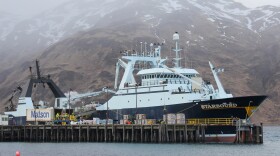
Theo Greenly
Contributing ReporterTheo Greenly covers the Aleutian and Pribilof Islands as a contributing reporter from partner stations KUCB in Unalaska, KSDP in Sand Point, and KUHB in Saint Paul. He has reported from the region since 2021, chasing stories by boat, by helicopter, and once by Jet Ski.
Theo began his public radio career at KCRW in Santa Monica. His work has aired on radio stations around the country, and he has contributed reporting to the Los Angeles Times, Anchorage Daily News, Science Friday, and NPR.
He studied journalism at Santa Monica College and is a graduate of the Transom Storytelling Workshop.
When not reporting, he’s probably looking for someone to go hiking with. Wanna go for a hike?
Email Theo at theo@kucb.org. You can call or text him at 907-359-6033 or on Signal at Theo.907.
-
The MV Tustumena is scheduled to make five chain runs between June and September, roughly the same schedule since the start/onset of the COVID-19 pandemic, when sailings were cut in half.
-
Subsistence communities in Western Alaska ask for strict limits on the Bering Sea trawl fishery.
-
The long-anticipated decision over pollock trawlers’ chum bycatch has seafood towns like Unalaska worried.
-
City celebrates Unalaska girls volleyball who repeat as 2A state champions
-
NOAA scientists emphasized that last year’s projections were reliable enough to guide 2026 limits.
-
The North Pacific Fishery Management Council voted to keep next season’s catch limits at just under 1.4 million metric tons.
-
St. Paul, Unalakleet and St. Mary’s all lost their main air carriers this year.
-
The payments cover seasons from 2021-2023, when stocks collapsed and fisheries remained closed.
-
Challenges and setbacks have plagued the case for years, including COVID-19 restrictions, postponements due to Ruckman’s original defense attorney undergoing cancer treatment and an earlier judge overseeing the case recusing himself.
-
The retrial of a 2019 Unalaska crash that killed two teens began Monday, when the court considered new photos and videos discovered after a mistrial earlier this year.











